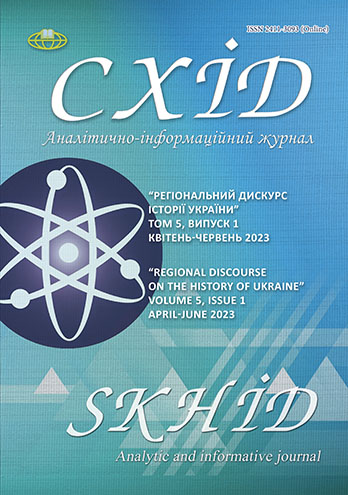The influence of the Tiflis entourage on the formation of Mykhailo Hrushevsky's personality
DOI:
https://doi.org/10.21847/2411-3093.2023.5(1).285693Keywords:
historical regionalism, the Tiflis intellectual entourage, the formation of Mykhaylo Hrushevsky's worldview, intellectual historyAbstract
The proposed study analyzes issues related to the formation of M. Hrushevsky's personality in Tiflis (Tbilisi) - the cultural center of the South Caucasus, where he spent his youth, studying in a gymnasium. The peculiarities of this region were considered and it was clarified how the entourage of Tiflis influenced the personality of young Mykhaylo. This, in the opinion of the article’s author, is important for a full understanding on the historical significance of the figure of Hrushevsky. In particular, the author draws attention to the influence of the Tiflis entourage in the matter of establishing the personality markers of young Mykhailo – the beginning of his intellectual biography formation, the way of establishing his Ukrainian patriotism, interests in Ukrainian studies, history of Ukraine, literature, folklore. Analysis of M. Hrushevsky's life gymnasium period permits to reveal the combination of creativity, innovation, unusual efficiency, ambition, and perseverance in his activities. Theoretical studies of authoritative foreign and Ukrainian scientists F. Brodel, L. Kjell, D. Ziegler, Ya. Vermenych, P. R. Magochy, S. Maksymenko and others are included in the analysis of the chosen subject. According to the interdisciplinary approach, the article combines elements of regional history, social psychology, and sociology.
Downloads
References
Braudel, F. (2013). The Identity of France. Space and history. [Trans. from Fr.]. Kyiv, Zhupansky Publishing. (In Ukrainian)
Burlaka, H. (2002). Literaturna spadshchyna M. Hru-shevskoho v konteksti ukrayinskoyi literatury. Ukrayinskyy istoryk. № 1-4, 308 – 312 (In Ukrainian).
Burlaka, H. (2011). Pysmennytska spadshchyna Mykhayla Hrushevskoho (p. V – ХХІ). In: H. Burlaka (comp.). Hrushevskyy M.S. Tvory, vol.12. Lviv, Svit, Seriya “Literaturno-krytychni ta khudozhni tvory” (In Ukrainian).
Burlaka, H. (2013). Lektura Mykhayla Hrushevskoho douniversytetskykh chasiv. Ukrayinskyy arkheohrafich¬nyy shchorichnyk, 18 (21), 296 – 310 (In Ukrainian).
Fedyay, M. (2021). «Doba vysokoletnykh ambitsiy i velykykh dosyahnen»: zhyttya Mykhayla Hrushevskoho v Tyflisi. Mykhailo Hrushevskyi Memorial Museum https://immh.kiev.ua/en/doba-visokoletnih-ambitsiy-i-velikikih-dosyagnen-zhittya-mihayla-grushevskogo-v-tiflisi/ (In Ukrainian).
Kakovkina, O. M. (2018). Heohrafiya Vserosiyskykh Arkheolohichnykh zyizdiv (1869–1914): na peretyni osobystykh, naukovykh, politychnykh interesiv. Bulletin of the Kharkiv National University: Series: History . Vol. 54, 41-52 https://periodicals.karazin.ua/history/article/-download/13616/12808/ (In Ukrainian).
Khjell, L., Ziegler, D. (2008). Teorii lichnosti. Osnovnyye polozheniya, issledovaniya i primeneniye. (3 Edition). St.Petersburg, Piter. (In Russian)
Maksymenko, S.D. (2008). Zahalna psykholohiya (3 Edition). Kyiv, Tsentr uchbovoyi literatury. (In Ukrainian)
Masnenko, V. (2016). «Istoryk – sluha narodu»: samorefleksiya ta reprezentatsiya Mykhayla Hrushevskoho (p. 56–71). Symposium historiographicum czercasiensium = Cherkasʹkyy istoriohrafichnyy sympozium Cherkasy, (In Ukrainian)
Nahorna, L.P. (2008). Rehionalna identychnist: ukrayinskyy kontekst. Kyiv, Kuras Institute of Political and Ethnic Studies of the National Academy of Sciences of Ukraine (In Ukrainian)
Nahorna, L.P. (2014). Istorychna kultura: kontsept, informatsiynyy resurs, reflektyvnyy potentsial. Kyiv, Kuras Institute of Political and Ethnic Studies of the National Academy of Sciences of Ukraine (In Ukrainian)
Plokhiy, S. (2011). Velykyy peredil. Nezvychayna istoriya Mykhayla Hrushevskoho. Kyiv, Krytyka (In Ukrainian)
Pyrih, R. Telvak, V. (2017). Mykhaylo Hrushevskyy: biohrafichnyy narys. Kyiv, Lybid (In Ukrainian)
Romantsova, N. I. (2020). Kavkazskiy period zhizni Mikhaila Grushevskogo – nachalo intellektual'noy biografii. Problema v ukrainskoy istoriografii. Kavkaz-Przeszłość-Teraźniejszość-Przyszłość. Instytut Historii Uniwersytetu Rzeszowskiego. № 6, 184–196 (In Russian).
Shapoval, Y., Verba, I. (2005). Mykhaylo Hrushevskyy. Kyiv, Alternatyvy (In Ukrainian).
Telvak, V. (2000). Molodist Mykhayla Hrushevskoho (do problemy formuvannya svitohlyadu). Grani. 6 (14) lystopad–hruden, 17–21 (In Ukrainian).
Vashchenko, V. (2007). Branets klasychnoyi osvity: «filolohichna svidomist» yak rushiy politychnykh proektiv M. Hrushevskoho. Rukopysna ta knyzhkova spadshchyna Ukrayiny. Issue 12, 142–153 (In Ukrainian).
Vashchenko, V. (2014). Psykhoanaliz yak istorychna dystsyplina: arkheolohichnyy dyskurs u tekstakh Z. Froyda. Naukovyy visnyk Mizhnarodnoho humanitarnoho universytetu. Seriya: Istoriya. Filosofiya. Politolohiya. 6, 25-31 (In Ukrainian).
Verba, I. (2002). Mykhaylo Hrushevskyy – himnazyst (p. 111–116). In: Mykhaylo Hrushevskyy – naukovets i polityk u konteksti suchasnosti. Zbirnyk naukovykh pratsʹ. Kyiv, Ukrayinska Vydavnycha Spilka (In Ukrainian).
Vermenych, Ya. V. (2007). Nova lokalna istoriya ta istorychna rehionalistyka: eksplikatsiya terminiv. Rehionalna istoriya Ukrayiny: Zb. nauk. st. Issue 1, 13–28 (In Ukrainian).
Vermenych, Ya. V. (2012). Rehionalistyka istorychna. In: Entsyklopediya istoriyi Ukrayiny. Vol. 9. Kyiv, 2012. http://www.history.org.ua/?termin=Rehionalistyka_istorychna (In Ukrainian).
Vermenych, Ya. V. (2018). Rehionalna analityka v Ukrayini: suchasni dyskursy sotsiohumanitarystyky. Analitychna zapyska. Kyiv, Instytut istoriyi Ukrayiny NAN Ukrayiny. 110 s.
Vynar, L. (1967). Molodist Mykhayla Hrushevskoho. 1866–1894. Munich, Ukrainian Historical Society. 36 s. (In Ukrainian)
Zashkilnyak, L. (1996). M. Hrushevskyy i Halychyna (do pryyizdu do Lvova 1894 r. Ukrayinskyy istoryk. № 1–4, 205–219 (In Ukrainian).
Downloads
Published
How to Cite
Issue
Section
License
Copyright (c) 2023 Наталя Романцова

This work is licensed under a Creative Commons Attribution-NonCommercial-NoDerivatives 4.0 International License.
1. Authors bear responsibility for the accuracy of facts, quotations, numbers and names used.
2. Manuscripts are not sent back.
3. The publisher does not always agree with the authors' opinion.
4. The authors reserve the right to authorship of the work and pass the first publication right of this work to the journal under the terms of a Creative Commons Attribution-NonCommercial-NoDerivatives 4.0 International License. This license allows others to distribute (copy) the published work for non-commercial purposes, provided there is mandatory attribution to its authors and a link to the first publication in our journal.
5. The authors have the right to conclude separate supplement agreements that relate to non-exclusive work distribution in the form in which it has been published by the journal (for example, to upload the work to the online storage of the journal or publish it as part of a monograph), provided that the reference to the first publication of the work in this journal is included.

